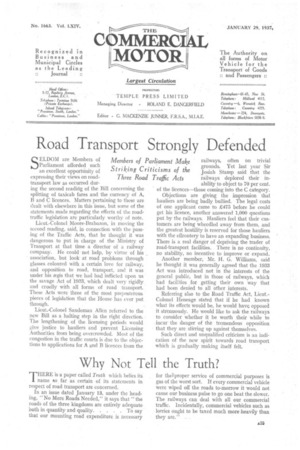Road Transport Strongly Defended
Page 27

If you've noticed an error in this article please click here to report it so we can fix it.
SELDOM are Members of Parliament afforded such an excellent opportunity of expressing their views on roadtransport law as occurred during the second readirlg of the Bill concerning the splitting of taxicab fares and the currency of A, B and C licences. Matters pertaining to these are dealt with elsewhere in this issue, but some of the statements made regarding the effects of the roadtraffic legislation are particularly worthy of note.
Lieut,-Colonel Moore-Braba.zon, in moving the second reading, said, in connection with the passing of the Traffic Acts, that he thought it was dangerous to put in charge of the Ministry of Transport at that time a director of a railway company. He could • not help, by virtue of his association, but look at road problems through glasses coloured with a certain love for railway, and opposition to road, transport, and it was under his aegis that we had had inflicted upon us the savage Act of 1933, which dealt very rigidly and cruelly with all forms of road transport. These Acts were three of the most preposterous pieces of legislation that the House has ever put through.
Lieut.-Colonel Sandeman Allen referred to the new Bill as a halting step in the right direction. The lengthening of the licensing periods would give justice to hauliers and prevent Licensing Authorities from being overcrowded. Most of the congestion in the traffic courts is due to the objections to applications for A and B licences from the railways, often on trivial grounds. Yet last year Sir Josiah Stamp said that the railways deplored their inability to object to 70 per cent. of the licences—those coming into the C category.
Objections are giving the impression that hauliers are being badly bullied. The legal costs of one applicant came to £475 before he could get his licence, another answered 1,000 questions put by the railways. Hauliers feel that their customers are being wheedled away from them, and the greatest hostility is reserved for those hauliers with the effrontery to have an expanding business. There is a real danger of depriving the trader of road-transport facilities. There is no continuity, no stability, no incentive to improve or expand.
Another member, Mr. H. G. Williams, said he thought it was generally agreed that the 1933 Act was introduced not in the interests of the general public, but in those of railways, which had facilities for getting their own way that had been denied to all other interests.
Referring also to the Road Traffic Act, Lieut.Colonel Heneage stated that if he had known what its effects would be, he would have opposed it strenuously. He would like to ask the railways to consider whether it be worth their while to incur the danger of the• tremendous opposition that they are stirring up against themselves.
Such direct and unqualified criticism is an indication of the new spirit towards road transport which is gradually making itself felt.




















































































